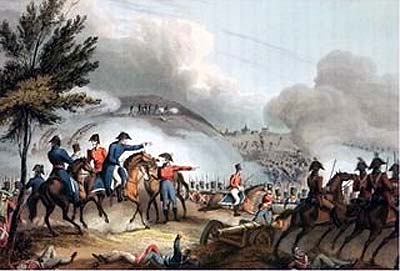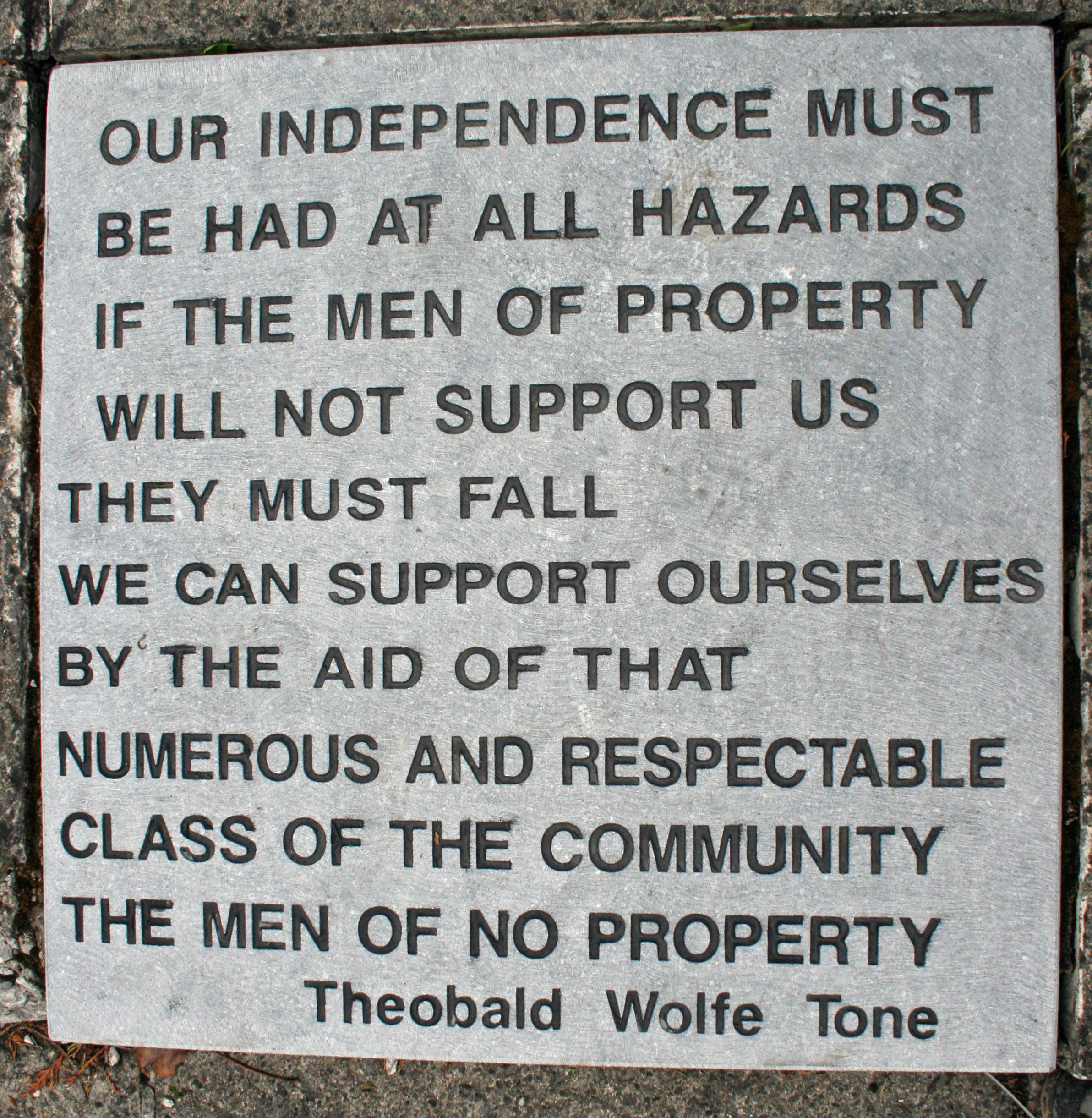|
Benjamin Lentaigne
Benjamin Lentaigne was born in France in 1773, but, as a Royalist and firm supporter of King Louis XVI, was forced to escape to England at the age of nineteen. Biography He went on to earn a medical qualification in England and join the British Army, being appointed to the 5th Dragoon Guards. He was posted to the Dublin barracks in 1795, and was involved in the treatment of Wolfe Tone, the leader of the 1798 Irish Rebellion, during his imprisonment and the final days of life. Lentaigne treated Tone just hours before he was due to be hanged and a pamphlet published in Latin by the doctor some years after Tone's official "suicide" refers to an unusual neck wound suffered by an unnamed patient which indicated that "a bullet passed through his throat". This has led to speculation that Tone may have been shot. His son was John Lentaigne.He died in 1847 References 1773 births French emigrants to England British Army regimental surgeons 18th-century British medical doctors ... [...More Info...] [...Related Items...] OR: [Wikipedia] [Google] [Baidu] |
Louis XVI Of France
Louis XVI (''Louis-Auguste''; ; 23 August 175421 January 1793) was the last King of France before the fall of the monarchy during the French Revolution. He was referred to as ''Citizen Louis Capet'' during the four months just before he was executed by guillotine. He was the son of Louis, Dauphin of France, son and heir-apparent of King Louis XV, and Maria Josepha of Saxony. When his father died in 1765, he became the new Dauphin. Upon his grandfather's death on 10 May 1774, he became King of France and Navarre, reigning as such until 4 September 1791, when he received the title of King of the French, continuing to reign as such until the monarchy was abolished on 21 September 1792. The first part of his reign was marked by attempts to reform the French government in accordance with Enlightenment ideas. These included efforts to abolish serfdom, remove the ''taille'' (land tax) and the ''corvée'' (labour tax), and increase tolerance toward non-Catholics as well as abolis ... [...More Info...] [...Related Items...] OR: [Wikipedia] [Google] [Baidu] |
5th Dragoon Guards
The 5th (Princess Charlotte of Wales's) Dragoon Guards was a British army cavalry regiment, officially formed in January 1686 as Shrewsbury's Regiment of Horse. Following a number of name changes, it became the 5th (Princess Charlotte of Wales's) Regiment of Dragoon Guards in 1804. In 1922, it was amalgamated with The Inniskillings (6th Dragoons) to form the 5th/6th Dragoons. Its history and traditions continue today in the Royal Dragoon Guards, an armoured cavalry unit of the British Army. History On 1 January 1686, several independent troops of horse raised in response to the 1685 Monmouth Rebellion were formed into the Earl of Shrewsbury's Regiment of Horse. After the 1688 Glorious Revolution, it served in the Williamite War in Ireland, including the Battle of the Boyne and the First Siege of Limerick. When the Nine Years' War ended in 1697, the regiment escaped disbandment by being made part of the Irish military establishment, where it remained until the creation of th ... [...More Info...] [...Related Items...] OR: [Wikipedia] [Google] [Baidu] |
Wolfe Tone
Theobald Wolfe Tone, posthumously known as Wolfe Tone ( ga, Bhulbh Teón; 20 June 176319 November 1798), was a leading Irish revolutionary figure and one of the founding members in Belfast and Dublin of the United Irishmen, a republican society determined to end British rule, and achieve accountable government, in Ireland. Throughout his political career, Tone was involved in a number of military engagements against the British navy. He was active in drawing Irish Catholics and Protestants together in the United cause, and in soliciting French assistance for a general insurrection. In November 1798, on his second attempt to land in Ireland with French troops and supplies, he was captured by British naval forces. The United Irish risings of the summer had already been crushed. Tone died in advance of his scheduled execution, probably, as modern scholars generally believe, by his own hand. Later generations were to regard Tone as the father of Irish Republicanism. His grave in ... [...More Info...] [...Related Items...] OR: [Wikipedia] [Google] [Baidu] |
1798 Irish Rebellion
The Irish Rebellion of 1798 ( ga, Éirí Amach 1798; Ulster-Scots: ''The Hurries'') was a major uprising against British rule in Ireland. The main organising force was the Society of United Irishmen, a republican revolutionary group influenced by the ideas of the American and French revolutions: originally formed by Presbyterian radicals angry at being shut out of power by the Anglican establishment, they were joined by many from the majority Catholic population. Following some initial successes, particularly in County Wexford, the uprising was suppressed by government militia and yeomanry forces, reinforced by units of the British Army, with a civilian and combatant death toll estimated between 10,000 and 50,000. A French expeditionary force landed in County Mayo in August in support of the rebels: despite victory at Castlebar, they were also eventually defeated. The aftermath of the Rebellion led to the passing of the Acts of Union 1800, merging the Parliament of Ireland into ... [...More Info...] [...Related Items...] OR: [Wikipedia] [Google] [Baidu] |
John Lentaigne
Rt. Hon. Sir John Francis O'Neill Lentaigne CB (21 June 1803 – 12 November 1886) was an Irish administrator, lawyer and Privy Counsellor. Life He was born 21 June 1803 in Tallaght, Dublin. His father was physician Dr. Benjamin Lentaigne of Dominick Street, Dublin, an immigrant from France. His mother was Marie Thérèse O'Neill, daughter of John O'Neill. He was one of the first pupils to attend school at Clongowes Wood College. He graduated from Trinity College and with a medical degree. He was a Privy Counsellor for Ireland from 1886. He served as a Justice of the Peace and Deputy Lieutenant for County Monaghan and was appointed High Sheriff of Monaghan for 1844–45. He became a member of the Prisons Board and was Inspector-General of Prisons in Ireland from 1854 to 1877 and Commissioner of National Education. He was president of the Statistical and Social Inquiry Society of Ireland between 1877 and 1878 and president of the Royal Zoological Society of Ireland. He was ... [...More Info...] [...Related Items...] OR: [Wikipedia] [Google] [Baidu] |
1773 Births
Events January–March * January 1 – The hymn that becomes known as ''Amazing Grace'', at this time titled "1 Chronicles 17:16–17", is first used to accompany a sermon led by curate John Newton in the town of Olney, Buckinghamshire, England. * January 12 – The first museum in the American colonies is established in Charleston, South Carolina; in 1915, it is formally incorporated as the Charleston Museum. * January 17 – Second voyage of James Cook: Captain Cook in HMS Resolution (1771) becomes the first European explorer to cross the Antarctic Circle. * January 18 – The first opera performance in the Swedish language, ''Thetis and Phelée'', performed by Carl Stenborg and Elisabeth Olin in Bollhuset in Stockholm, Sweden, marks the establishment of the Royal Swedish Opera. * February 8 – The Grand Council of Poland meets in Warsaw, summoned by a circular letter from King Stanisław August Poniatowski to respond to the Kingdom's threate ... [...More Info...] [...Related Items...] OR: [Wikipedia] [Google] [Baidu] |
French Emigrants To England
French (french: français(e), link=no) may refer to: * Something of, from, or related to France ** French language, which originated in France, and its various dialects and accents ** French people, a nation and ethnic group identified with France ** French cuisine, cooking traditions and practices Fortnite French places Arts and media * The French (band), a British rock band * "French" (episode), a live-action episode of ''The Super Mario Bros. Super Show!'' * ''Française'' (film), 2008 * French Stewart (born 1964), American actor Other uses * French (surname), a surname (including a list of people with the name) * French (tunic), a particular type of military jacket or tunic used in the Russian Empire and Soviet Union * French's, an American brand of mustard condiment * French catheter scale, a unit of measurement of diameter * French Defence, a chess opening * French kiss, a type of kiss involving the tongue See also * France (other) * Franch, a surname * French ... [...More Info...] [...Related Items...] OR: [Wikipedia] [Google] [Baidu] |
British Army Regimental Surgeons
British may refer to: Peoples, culture, and language * British people, nationals or natives of the United Kingdom, British Overseas Territories, and Crown Dependencies. ** Britishness, the British identity and common culture * British English, the English language as spoken and written in the United Kingdom or, more broadly, throughout the British Isles * Celtic Britons, an ancient ethno-linguistic group * Brittonic languages, a branch of the Insular Celtic language family (formerly called British) ** Common Brittonic, an ancient language Other uses *''Brit(ish)'', a 2018 memoir by Afua Hirsch *People or things associated with: ** Great Britain, an island ** United Kingdom, a sovereign state ** Kingdom of Great Britain (1707–1800) ** United Kingdom of Great Britain and Ireland (1801–1922) See also * Terminology of the British Isles * Alternative names for the British * English (other) * Britannic (other) * British Isles * Brit (other) * Briton (d ... [...More Info...] [...Related Items...] OR: [Wikipedia] [Google] [Baidu] |
18th-century British Medical Doctors
The 18th century lasted from January 1, 1701 ( MDCCI) to December 31, 1800 ( MDCCC). During the 18th century, elements of Enlightenment thinking culminated in the American, French, and Haitian Revolutions. During the century, slave trading and human trafficking expanded across the shores of the Atlantic, while declining in Russia, China, and Korea. Revolutions began to challenge the legitimacy of monarchical and aristocratic power structures, including the structures and beliefs that supported slavery. The Industrial Revolution began during mid-century, leading to radical changes in human society and the environment. Western historians have occasionally defined the 18th century otherwise for the purposes of their work. For example, the "short" 18th century may be defined as 1715–1789, denoting the period of time between the death of Louis XIV of France and the start of the French Revolution, with an emphasis on directly interconnected events. To historians who expand t ... [...More Info...] [...Related Items...] OR: [Wikipedia] [Google] [Baidu] |
1847 Deaths
Events January–March * January 4 – Samuel Colt sells his first revolver pistol to the U.S. government. * January 13 – The Treaty of Cahuenga ends fighting in the Mexican–American War in California. * January 16 – John C. Frémont is appointed Governor of the new California Territory. * January 17 – St. Anthony Hall fraternity is founded at Columbia University, New York City. * January 30 – Yerba Buena, California, is renamed San Francisco. * February 5 – A rescue effort, called the First Relief, leaves Johnson's Ranch to save the ill-fated Donner Party (California-bound emigrants who became snowbound in the Sierra Nevada earlier this winter; some have resorted to survival by cannibalism). * February 22 – Mexican–American War: Battle of Buena Vista – 5,000 American troops under General Zachary Taylor use their superiority in artillery to drive off 15,000 Mexican troops under Antonio López de Santa Anna, defeating the Mexicans the next day. ... [...More Info...] [...Related Items...] OR: [Wikipedia] [Google] [Baidu] |




.jpg)
